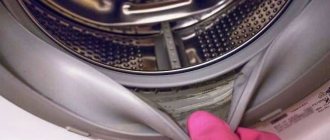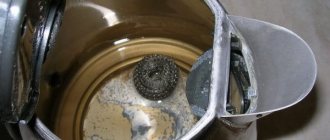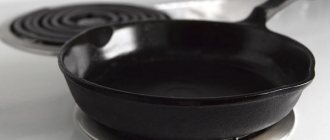The service life of a washing machine is about 10 years, but this time is significantly reduced due to negative factors, including improper operation and the formation of scale on parts. It’s easy to read the instructions for the equipment, but how to descale your machine at home? Let's talk about known methods of combating harmful plaque.
Scale and the reasons for its appearance
Scale is a hard deposit that forms on the walls and parts of water heating vessels (steam boilers, kettles, titaniums). Plaque on the heating element (tubular heater) of the washing machine, as well as on the walls of the drum, is one of the most striking examples of scale formation. Such contaminants appear due to the high concentration of magnesium and calcium salts in tap water, which, when heated, settle on machine parts in the form of a solid sediment.
It is not easy to see the scale, since the heating element itself is hidden behind the drum. But there are several factors that should convince the housewife - it’s time to buy a descaler for washing machines, or use proven folk methods. When should you not delay cleaning?
- tap water is too hard;
- The device is often washed at high heating temperatures;
- the housewife uses a lot of chemical laundry detergents containing a large amount of harmful impurities;
- The machine has been in use for a long time, but the drum and heating element have never been cleaned.
The fact that the device is often used in the “intensive washing” mode should not at all become a reason for reproach for the owner. After all, a washing machine should not sit idle. But like any equipment, the machine requires maintenance.
What you need to know about scale
As a rule, tap water is quite hard, that is, it contains a lot of salts, which, when heated, settle on various surfaces in the form of a white or yellowish coating. Soft water is quite rare, and it will still form sediment over time. Of course, there are modern cleaning systems that can soften water, thereby making it safe for parts. However, not everyone can afford to install such filters.
Main filters installed on the water supply system can significantly reduce water hardness
Washing at high temperatures and using liquid detergents instead of traditional powders speeds up the process of scale formation.
Why is limescale in a washing machine dangerous? A layer of deposits accumulating on the surface of the heating element tubes prevents the heater from conducting heat. First, the energy consumption of the washing machine increases, and the water heating process slows down. If there is too much scale, the device overheats and fails. As a result, the washing machine cannot wash and displays the corresponding error code.
A thick layer of scale that forms on the heating element tubes leads to its failure
The formation of limescale occurs in almost every washing machine. It is not difficult to verify the presence of plaque on the heating element tubes; you just need to try to examine the device. Take a flashlight and shine it on the bottom of the washing machine drum, usually the heating element is located directly below it. Through the holes in the drum it will be possible to inspect the tubes for scale formation.
So, you are convinced that the problem of limescale has also affected your equipment. Further in our article we will tell you how to remove scale from an automatic washing machine.
Why is it important to fight scale?
Is periodic cleaning of washing equipment really necessary? The fact is that most of the pollution is hidden from view, but the consequences of their accumulation will not take long to appear:
- dirt and scale harm the heater, reducing its efficiency and also contributing to rapid wear of parts;
- the water in the machine does not heat up well;
- electricity consumption increases;
- laundry does not become cleaner when washed and acquires an unpleasant odor;
- Particles of scale, dirt and rust clog the drain pump filter, as a result of which water does not drain from the machine
- equipment stops working, requiring parts to be replaced.
If things get serious and the machine refuses to wash, you have to call a technician. It is not difficult to guess that changing the heating element requires serious expenses. But timely measures will save your wallet and significantly extend the life of the device. At the same time, it is not necessary to buy a professional anti-scale agent for washing machines - any housewife will find suitable products at home.
Ways to deal with deposits
Experts offer several ways to deal with the resulting scale. Methods can be divided into:
- chemical;
- physical;
- technological.
Chemical
The essence of this method is that some acid-containing product is poured into the unit - it will remove scale. The machine itself switches to washing mode, but without laundry. During operation, the water heats up and a chemical reaction occurs that cleans both the heating element and the walls of the tank from scale.
One of the well-known examples of anti-scale agent is “Kalgon”. But despite a lot of advertising, such a remedy does not give an instant and one-time effect, especially when it comes to old limescale deposits. This acid solution is quite weak, and therefore will have to be used again and again.
Another thing is citric acid, known to all housewives, which costs a penny and is sold in any grocery store. This folk method will help to radically cope with the problem. The product is poured into the compartment instead of washing powder in the amount of 2-3 packages at a time, and the unit is turned on for washing at a temperature of ninety degrees. After completing the process, all that remains is to clean the drain filter, where there may be pieces of exfoliated plaque.
For the health of the washing machine, it will be enough to carry out this procedure once a year.
But the chemical method also has a drawback - an overdose can damage the rubber parts of the machine. Acid fumes are also harmful and worsen the atmosphere of the apartment.
Physical
We are talking about installing special magnetic water softeners - this means converters and filters. They can be installed both in the drainage system and in the hose of the unit itself.
Manufacturers offer the following options:
- A magnetic softener is needed to remove calcium and magnesium from the water entering the device. This is “monitored” by constantly operating magnets, which split molecules into ions, and therefore make the appearance of calcite (lime) impossible. Such know-how is also captivating because over time, all parts of the machine will get rid of existing scale. Of course, they are not cheap, but the declared service life is half a century.
- There are also devices like mechanical sedum filters. One of these varieties is a sedimentation device with a replaceable cartridge in which sand, dirt and rust settle.
How to descale a washing machine at home
So, you will hardly be able to see the plaque with your own eyes, much less reach it with your hands. Then, how to clean a washing machine from scale? At home, owners of smart technology can use the available products stored in the kitchen cabinet: citric acid, vinegar, soda. It will cost a little more to buy professional cleaning agents, and in advanced cases, a specialist will be able to remove the heating element and clean it manually - this is more profitable than buying a new part.
Lemon acid
Many people use citric acid to clean teapots and pots; the magic powder will also help in the fight against scale. The universal product will dissolve limescale and also get rid of the unpleasant smell of dampness. How to clean a washing machine with citric acid?
- Pour 50-100 grams of acid into the powder compartment.
- Select intensive wash mode.
- Set the temperature in the range from 50 to 90 degrees. When heated, citric acid will interact with salt deposits, breaking them down.
- Start the wash. There is no need to load laundry into the drum - cleaning occurs at idle speed. Spinning is also not required, but an additional rinse will not hurt.
- Repeat the procedure every 3-6 months depending on the frequency of use of the machine.
The advantages of citric acid include not only availability, but also harmlessness - the white powder does not damage machine parts.
Citric acid + bleach
One of the effective ways to remove limescale from a machine is to use citric acid in combination with bleach.
- A glass of citric acid is poured into the powder compartment, a glass of bleach is poured into the drum (without laundry).
- Select intensive washing mode with a temperature of 90-95 degrees.
- Perform an additional rinse after the end of the wash cycle.
One of the significant disadvantages of this product is the strong smell of bleach, which is not only unpleasant, but also harmful. To avoid breathing chloride fumes, care should be taken to thoroughly ventilate the room during washing. Also, instead of bleach, chlorine-containing products are poured into the drum when washing - Belizna, “Duckling”, “Comet” and so on. These preparations do not emit such toxic odors as pure chlorine.
It is harmful to abuse chlorine-containing products not only because of the formation of fumes. Using chlorine, you can easily ruin rubber seals, which become deformed under the influence of such substances.
Vinegar
Many modern housewives know how to clean a washing machine with vinegar. This universal remedy has the most powerful effect of all folk methods.
- Pour 2 cups of vinegar essence into the powder compartment.
- Set the long-term washing mode with high water heating temperature.
- Run the wash at idle speed (without laundry). A few minutes after starting, you should stop the process for about an hour. This will allow the vinegar to penetrate into the most remote corners of the machine.
- Restart the machine until the cycle completes.
- Turn on an additional rinse or quick wash mode - this will help get rid of the remaining solution.
Vinegar + soda
Vinegar combined with baking soda can work wonders on appliance parts. Here is another recipe for a homemade anti-scale cleaner:
- Mix 2 tablespoons of baking soda and a quarter cup of plain water. Pour the mixture into the washing powder tray.
- Pour a glass of table vinegar into the drum.
- Run a single wash at maximum temperature for the longest time possible.
Vinegar is even more aggressive to plaque than citric acid. If used carelessly, the vinegar solution can damage the rubber seals inside the machine. But in skillful hands, vinegar will make the drum and other parts shine again.
Washing machine drum
Dirt and scale often accumulate in the drum, which also needs to be gotten rid of in order to increase the life of the equipment. Expensive modern models of washing machines have a “drum cleaning” function. In this case, you just need to press a button and watch the process.
However, most machines do not have such a miracle function, and you have to deal with unpleasant deposits manually. Methods for removing contamination are quite simple, effective and economical:
- You need to pour 100 g of bleach into the drum and turn on the machine for a long wash program at high temperature. After completing the wash, it is recommended to turn on the rinse mode, so all parts will be additionally cleaned of the solution. Using this method you can get rid of unpleasant odors, scale and mold;
- pour 200 g of citric acid into an empty drum. Start the washing mode at maximum temperature. After washing, be sure to include an additional rinse. This method will qualitatively remove plaque and restore the lost shine to the drum;
- Experts recommend wiping the machine door to remove water after each wash and leaving it open. It is important to pay special attention to the rubber seal; it must be wiped dry. This will protect the drum from the formation of mold and mildew.
Cleaning products from the store
Experts classify most professional “chemicals” from the store as extremely undesirable products, which are recommended to be used no more than once every 6 months. The reason lies in their composition, which contains acid that is harmful to equipment parts.
Such products include Indesit or Electrolux liquids, Bubble Ice powder, Filtero or Astonish. Before descaling your washing machine using these preparations, you should carefully read the instructions. There are two ways to rid the heating element of scale:
- soaking the heating element;
- pouring the detergent into the cold wash drum.
Many people are familiar with the gel under the brand name “Calgon”. How to clean an automatic washing machine at home using it? Unfortunately, advertising exaggerates the properties of this drug. Calgon contains sodium polyphosphate, whose properties allow you to soften hard water and avoid scale formation. But he will not be able to remove the resulting calcium-magnesium plaque.
Experts note that excessive use of Calgon only reduces the life of the washing machine. An attentive housewife will also notice that polyphosphates are already included in most washing powders. Therefore, there is no need to spend money on expensive gel. In addition, there are cheaper gel analogues on the household chemicals market - Antiscale or Breeze.
Unfortunately, not all pollution goes down the drain.
... a lot settles on the internal parts, which leads to plaque and a musty smell.
The heating element - the most vulnerable part of the washing machine usually does not look as rosy as the drum after a few months of service and it is impossible to get to it without disassembling the machine.
But even if you are completely confident in the softness of the water and add descaling agent every time you wash, you still need preventive maintenance for your washing machine with citric acid.
Clothes lint can get caught in the weight of machine parts, including the heating element, clogging hoses and causing operational problems. Residual dirty water and laundry detergent can accumulate inside the washing machine, forming a slimy residue that eventually begins to smell. Many people believe that regular washing without downtime helps combat this, but this is only an illusion; self-cleaning of the internal elements of the washing machine does not occur.
Cleaning a washing machine should include disinfection, since bacteria can get inside the washing machine in various ways, and are killed only when washed at high temperatures. Otherwise, a warm and humid environment is an excellent place for bacteria to grow.
Many housewives have been using citric acid for prevention for many years, leaving good reviews for this method. Is it worth a try?
Attention!
Please note that servicing an automatic washing machine with citric acid is precisely a preventative measure taken in advance, and not a way to remove extreme amounts of plaque. In advanced cases, professional chemistry is needed.
Prevention
Simple prevention methods will help you avoid the formation of persistent plaque:
- It is known that salt particles in hard water crystallize at temperatures above 750. This means that those washing programs in which the water will not heat up above 700 will help reduce the risk of scale formation on the heating element.
- Magnetic water filters will help both washing equipment and its owners. A smart device will make the water less hard, which will benefit the health of apartment residents, while keeping the machine parts clean.
- From time to time it is worth carrying out preventive cleaning. Frequency – every 6 months. For hard water, prevention is recommended at least once every two months.
- Saving on powder is a false economy. Harmful compounds contained in laundry detergents negatively affect the condition of the heating element. It is better to choose a special powder with a softening element.
- The simplest rules will help keep the device in proper condition: do not leave wet laundry in the drum, after washing, wipe the inside with a dry cloth, and periodically ventilate the machine.











